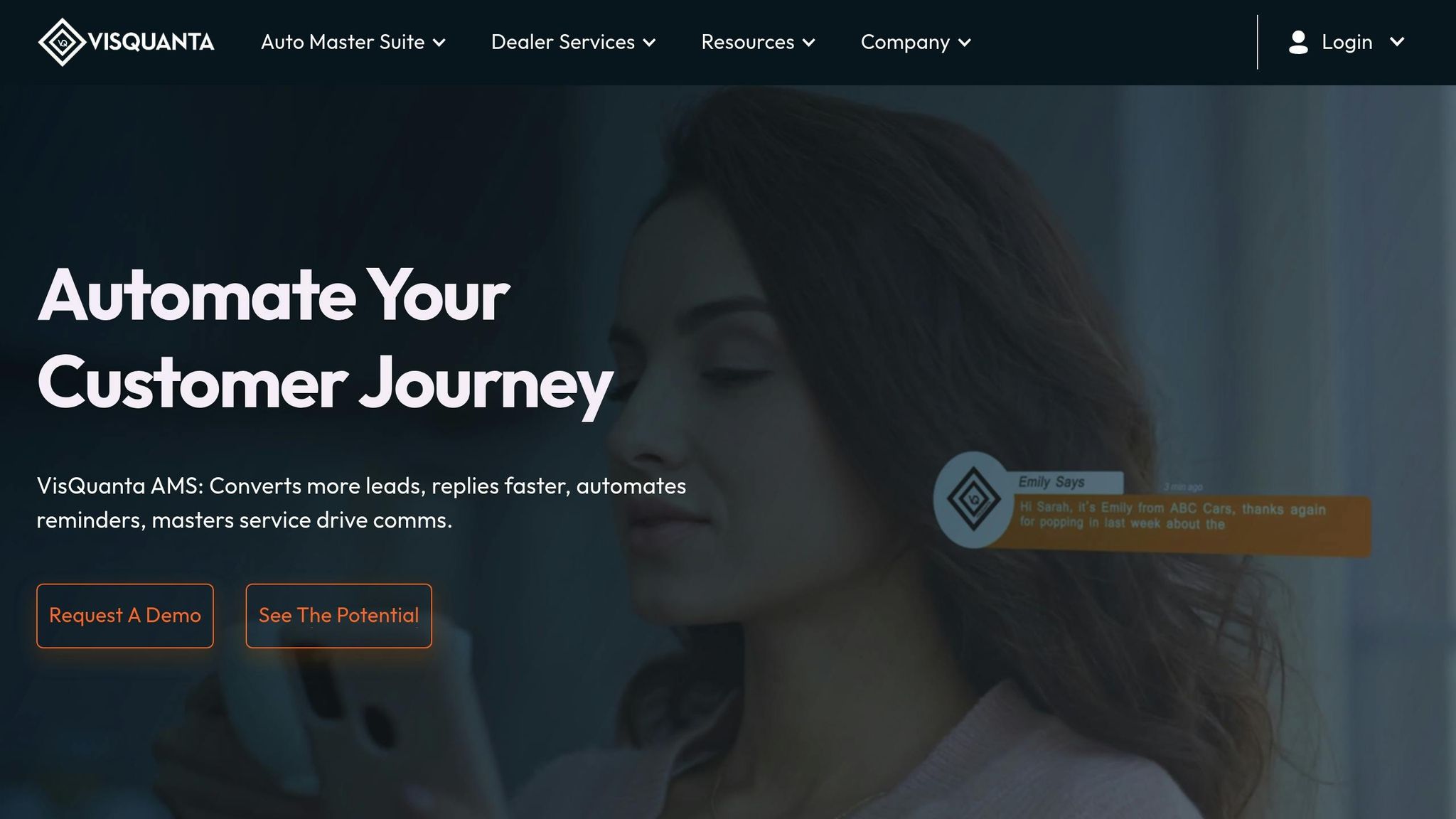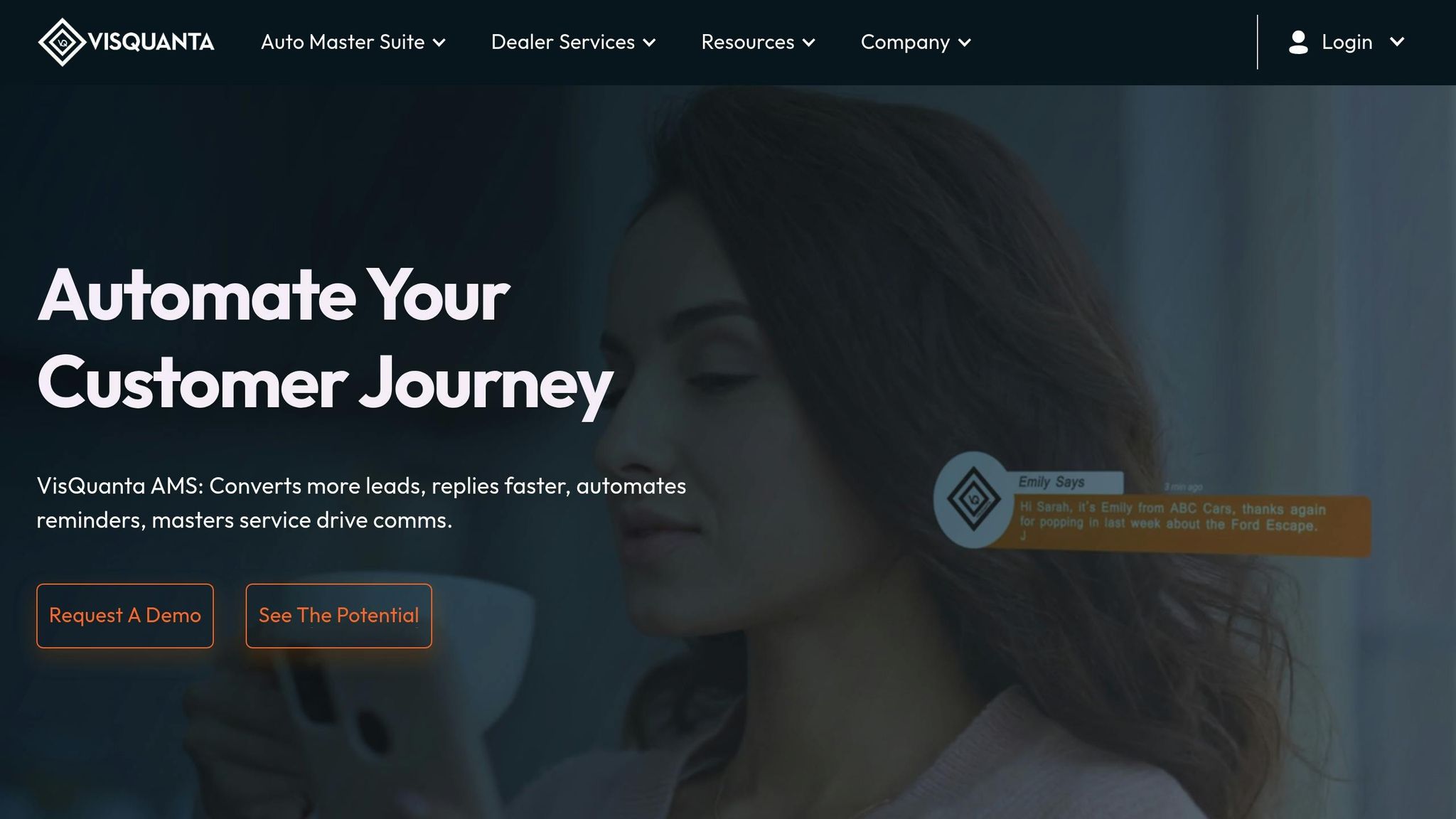The Hidden Revenue Problem
84% of CRM leads go untouched after 30 days: that's millions in latent revenue sitting idle. AI reactivation recovers $50K-$200K monthly from existing databases without new ad spend.
The faster you respond to a car buyer’s inquiry, the higher your chances of making the sale. Studies show dealerships that reply within 5 minutes are 100 times more likely to close deals compared to those that take 30 minutes or more. In today’s competitive market, where buyers contact multiple dealerships at once, being the first to respond often secures the appointment and the sale.
Key Takeaways:
- Speed to lead: The time it takes to respond to a customer inquiry is critical. Faster responses build trust and increase conversion rates.
- Data proves it: Responding in under 5 minutes boosts sales potential significantly, while delays beyond 30 minutes drastically reduce success rates.
- Challenges: Manual processes, fragmented communication systems, and outdated technology slow many dealerships down.
- Solutions: Automating lead routing, setting clear response goals, and using tools like AI-driven platforms can eliminate delays and improve performance.
Bottom line: Speed isn’t just about being fast - it’s about being first and precise. Dealerships that prioritize immediate, personalized responses gain a competitive edge and drive higher sales.
Stop Getting Ghosted: Lead Handling Fix for Car Dealers
sbb-itb-0329cfa
The Numbers: How Response Time Affects Lead Conversion
When it comes to sales performance, speed matters. The faster a dealership responds to a lead, the better the chances of turning that inquiry into a sale. Let’s take a closer look at the data that underscores just how crucial quick response times are.
Why Fast Follow-Up Matters
Here’s the bottom line: dealerships that respond to leads within five minutes are 100 times more likely to close a sale than those that take 30 minutes or longer [1]. And if they can respond within 60 to 90 seconds? The likelihood of conversion triples [2]. It’s not just about being quick - it’s about being the first. A staggering 78% of customers choose to buy from the first company that responds to their inquiry.
Despite these numbers, most dealerships fall short. Only 7% manage to respond within five minutes [4], and an almost negligible 0.1% engage leads in under that timeframe [3]. This lack of urgency creates a clear opportunity for dealerships that prioritize faster follow-ups.
The Cost of Being Slow
If fast responses boost sales, slow ones can do the opposite - and the numbers paint a grim picture. More than 66% of dealership leads don’t receive a response within 24 hours, and 37% are either mishandled or completely lost [4]. Even worse, 27% of leads are ignored altogether [5][6].
Get weekly AI strategies for your dealership
Join 2,500+ automotive professionals. No spam.
Timing is everything. After the optimal response window passes, the chance of reaching a customer drops by a factor of eight. These delays don’t just hurt conversion rates - they can cripple overall sales performance.
So, why do so many dealerships struggle to respond quickly? The challenges behind these delays are worth exploring further.
Common Obstacles to Fast Lead Response at Dealerships
Even though dealerships understand the importance of quick responses to leads, putting that knowledge into practice often proves challenging. Several persistent issues in the industry make fast follow-ups difficult, leaving potential sales opportunities on the table.
Manual Processes and Limited Staffing
Relying on manual processes slows everything down. When a lead comes in through the website, it’s often sent to an email inbox or even printed out and handed off to someone. From there, a salesperson has to manually review the details, search for the customer in the system, and then reach out.
This approach creates delays, especially outside of normal business hours. Leads that come in during the evening or on weekends often sit untouched until the next business day. And if the assigned salesperson is tied up - helping a customer on the lot, answering another inquiry, or simply away from their desk - the lead has to wait. Staffing challenges, particularly during peak times like weekends, make the problem worse, as many shoppers browse and submit inquiries during these hours.
Fragmented Communication Systems
Dealerships often juggle multiple communication channels that don’t work together. Leads from the website might go to one email address, AutoTrader inquiries to another, Facebook messages to the social media manager, and phone call logs to yet another system.
This lack of integration wastes time and creates confusion. Salespeople end up jumping between platforms, copying and pasting information, and struggling to get a clear view of each lead. It also leads to miscommunication - sometimes multiple team members respond to the same lead, or worse, no one does because everyone assumes someone else has it covered.
Outdated Technology and Underused Automation
Technology gaps add another layer of delay. Many dealerships either lack a modern CRM or don’t take full advantage of the one they have. Without automation, every lead requires manual handling before a response can happen.
Even dealerships with advanced CRM systems often fail to use features like instant acknowledgment emails, automatic lead assignment, or follow-up sequences. This underutilization stems from poor training or improper system setup. Additionally, salespeople might not get real-time notifications when leads come in, meaning they only see them hours later when they check their email or CRM dashboard.
Another roadblock is the lack of integration between the CRM and other dealership systems. For example, if the CRM doesn’t connect with inventory management, salespeople can’t quickly confirm vehicle availability. These small inefficiencies pile up, turning what should be a quick response into a much longer process.
Tested Methods to Improve Speed to Lead
Delays in responding to leads can be tackled with the right strategies. Dealerships that focus on improving their speed to lead can adopt several methods that deliver measurable outcomes. By addressing both technology gaps and process inefficiencies, these strategies create a practical and results-driven approach. The journey often begins with automating key processes.
Automate Lead Routing and Follow-Up
Start by automating the initial response to every inquiry - whether through email or text. A quick acknowledgment reassures customers that their request is being handled while giving your sales team time to craft a personalized follow-up.
Automated lead routing ensures inquiries are assigned promptly. Whether it's based on territory, vehicle type, or salesperson availability, this system eliminates the delays caused by unclaimed leads.
To keep prospects engaged, automated follow-up sequences are essential. These sequences should start with an immediate confirmation and then transition into personalized outreach. Including relevant details like vehicle options, financing information, or scheduling links ensures the process feels tailored rather than robotic.
Set Internal Response Time Goals
Define realistic response time goals for your team and track their performance. Instead of setting overly ambitious targets that are hard to maintain, focus on achievable benchmarks that can be consistently met during and outside of business hours.
Accountability is key to improvement. Regularly reviewing response times at both individual and team levels helps identify areas needing attention. Displaying real-time performance metrics can also motivate staff to maintain high standards and improve response consistency.
Use Multiple Communication Channels
Reaching prospects through their preferred communication platforms increases the likelihood of a successful connection. While some customers prefer phone calls, others might respond better to text messages or emails. A multi-channel approach ensures no lead is left behind.
Text messages, for example, are highly effective due to their high open rates and quick engagement. A short, personalized text often gets faster responses compared to lengthy emails.
Live chat integration on your dealership’s website is another powerful tool. Whether managed by a trained representative or a smart chatbot, live chat can significantly reduce the time between a customer’s initial inquiry and your first interaction.
Phone calls remain vital, especially for high-intent leads. A timely call captures prospects while they are actively researching, avoiding the risk of losing their interest due to delayed follow-up.
Technology Focus: How VisQuanta Improves Speed to Lead

Tackling manual delays and disjointed systems requires more than just strategy - it demands the right technology. VisQuanta steps in with a solution that blends advanced AI tools and tailored dealership training to address the common hurdles slowing down lead response times. By integrating seamlessly into existing processes, this technology enhances performance without disrupting workflows.
The AutoMaster Suite: AI-Powered Tools for Faster Responses

At the heart of VisQuanta's solution is the AutoMaster Suite, an AI-driven platform designed to integrate directly with your current CRM system. Instead of requiring a complete overhaul, this system complements your existing setup, boosting efficiency while keeping disruptions to a minimum.
Key features include:
- Instant Lead Routing: Leads from multiple channels are captured and routed immediately based on predefined criteria, cutting out manual delays and ensuring rapid responses.
- Database Reactivation: AI scans dormant data to re-engage past prospects through personalized outreach, turning forgotten leads into fresh opportunities.
- SMS Compliance and Legal Support: The platform manages compliance for text-based communications, protecting dealerships from legal risks while maintaining effective messaging.
- Real-Time Performance Tracking: Managers gain live insights into response times and conversions, enabling quick adjustments to keep lead response times optimal throughout the day.
Real Results and Revenue Impact
VisQuanta’s automated tools deliver measurable outcomes. By improving lead response times and reactivating dormant data, the system has generated over $9.5 million in additional revenue for dealerships.
The benefits are clear:
- Faster Contact Rates: Automated responses ensure leads are contacted within minutes, boosting appointment-setting rates and increasing sales conversions.
- Enhanced Online Reputation: Built-in reputation management tools monitor and improve online reviews, creating a positive cycle that attracts better-quality leads over time.
- Recovered Opportunities: Dormant leads are reactivated and converted into appointments, unlocking revenue from existing lead acquisition efforts.
This combination of speed, efficiency, and reputation enhancement helps dealerships stand out in a competitive market.
Custom Training and Ongoing Support
Technology alone isn’t enough - it needs to be paired with effective training and reliable support. VisQuanta offers custom sales training tailored to each dealership’s unique structure and goals.
Training focuses on two key areas:
- Technical Mastery: Staff learn how to use the AutoMaster Suite effectively while maintaining the personal connection that drives automotive sales.
- Sales Process Improvements: Broader techniques are introduced to refine and enhance current sales strategies.
Before rolling out solutions, performance audits identify specific weaknesses in the dealership’s processes. This ensures the training targets real challenges, not generic industry issues.
VisQuanta also provides continuous support to adapt to changing market conditions. This includes regular system updates, additional training sessions, and strategic consultations to help dealerships get the most out of their investment.
Conclusion: Speed to Lead as a Business Advantage
In the fast-paced automotive market, speed to lead is no longer optional - it's a critical factor that defines a dealership's ability to turn potential customers into loyal buyers. Dealerships that respond quickly to inquiries consistently outperform those that lag behind.
The Cost of Delayed Lead Responses
Slow response times come with a hefty price tag. It’s not just about losing a single sale; the ripple effects touch revenue, reputation, and long-term customer trust. Studies show that 78% of buyers go with the first business to respond to their inquiry[8]. That means every minute counts - responding within 60 seconds can boost conversion rates by an astonishing 391%[4][9]. On the flip side, even brief delays can severely reduce the likelihood of closing a deal[4][9].
But the impact doesn’t stop there. When customers experience slow responses, it chips away at their confidence in the dealership. Quick replies show respect for their time and build trust, while delays risk alienating potential buyers and tarnishing the dealership's reputation[4][7]. This loss isn’t just about one transaction; it translates into missed opportunities for future purchases, service revenue, and valuable referrals.
Leveraging Technology and Best Practices for Success
To combat these challenges, dealerships need to combine cutting-edge technology with effective processes. By integrating AI-driven automation and refining their workflows, dealerships can achieve the kind of speed and efficiency that sets them apart.
As highlighted earlier, fast lead responses are a proven driver of higher conversion rates and increased revenue. Tools like VisQuanta's AutoMaster Suite tackle common bottlenecks, automating the lead management process to eliminate unnecessary delays.
Beyond technology, success hinges on setting clear response time goals, utilizing multiple communication channels, and equipping staff with the skills to deliver personalized interactions. Together, these strategies create a competitive edge that slower competitors simply can’t match.
Finally, real-time performance tracking ensures dealerships can identify and resolve issues as they arise. Paired with tailored training programs, this approach keeps teams sharp, enabling them to maximize the benefits of new tools while maintaining the personal touch that builds lasting customer relationships.
FAQs
Frequently Asked Questions
Frequently Asked Questions
.jpg&w=3840&q=75)
5 AI Tools Every Car Dealership Needs to Boost Sales
Boost car dealership sales with 5 proven AI tools. Respond to leads faster, revive dormant prospects, optimize inventory, and increase conversions by 32%.

7 CRM Strategies to Revive Dormant Leads
7 proven CRM strategies to re-engage dormant leads, boost conversions, and turn inactive prospects into loyal dealership customers.

